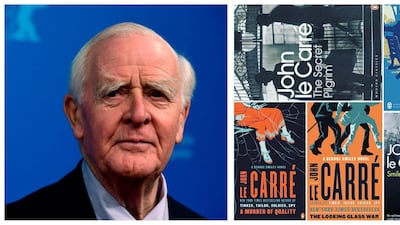As the tributes pour in for John le Carre, who has died aged 89, fans have been taking to social media to share their favourite novels by the British author.
Called a "literary giant" by horror author Stephen King, le Carre was a master of the spy genre, with The New York Times dubbing him "the pre-eminent spy writer of the 20th century".
Having worked during the 1950s and 1960s for British security service MI5, as well as secret intelligence service MI6, le Carre (born David Cornwell) was perfectly positioned to turn his hand to espionage novels, producing more than 20 during his lifetime.
It was his third novel, 1963's The Spy Who Came in from the Cold, which won him global acclaim, with Our Man in Havana author Graham Greene calling it "the best spy story I ever read".
Having created many enduring and memorable characters, it is intelligence officer George Smiley, played by British actor Gary Oldman on the big screen, who stands out.
Short, bespectacled and overweight, le Carre said he created Smiley as an antidote to Ian Fleming’s super-suave James Bond, who le Carre felt didn’t accurately depict spies or the espionage life. And, ultimately, it is Smiley’s ability to blend into the wallpaper that turns him into one of Britain’s most powerful spies.
Here, we choose five of le Carre’s novels that showcase a master of his tradecraft …
1. ‘The Spy Who came in from the Cold’
Published in 1963, this is the novel that cemented le Carre in the public consciousness. Set in Berlin during the heightened tensions of the late 1950s and early 1960s, station head Alec Leamas is called back to London from West Berlin after his last and best double agent is killed while trying to defect from East Germany.
With no more operatives to call on, Leamas himself is asked to stay “in the cold” for a final mission: to defect to East Germany and unmask Hans-Dieter Mundt, the head of the powerful Abteilung organisation, as a British double agent.
2. ‘Tinker Tailor Soldier Spy’
Le Carre’s 1974 novel came in the wake of British “Cambridge Five” member Kim Philby’s 1963 defection to the Soviet Union, following his unmasking as a double agent. Handling complex social commentary, it remains a staple of the spy fiction genre.
Set in 1973, as Cold War tensions are rapidly escalating, George Smiley is unhappy in his forced retirement, following the failed Operation Testify in Czechoslovakia, which led to the capture and torture of a British agent.
Approached by his former protege Peter Guillam, Smiley is tasked with weeding out a mole who has infiltrated the very highest levels of the Circus – the code name for the British Secret Intelligence Service, whose London office is at Cambridge Circus.
3. ‘The Honourable Schoolboy’
The winner of the 1977 Gold Dagger award for crime novel of the year, as well as the James Tait Black Memorial Prize, The Honourable Schoolboy follows Smiley's mission to prevent the intelligence service being dismantled by the British government.
With almost irreparable damage done to the department by double agent Bill Haydon, and seeking ways to target Moscow spymaster Karla, Smiley and analysts Connie Sachs and Doc di Salis follow the money to a cash-laundering operation in Laos, which could be a Moscow intelligence operation.
4. ‘The Little Drummer Girl’
A favourite of horror author Stephen King, this spy novel was published in 1983 and follows Charlie, a left-wing British actress, who is recruited by spy Martin Kurtz to help him track down a terrorist, Khalil. Charlie’s case officer, Joseph, impersonates Khalil’s younger brother, Salim, and travels through Europe with Charlie in a bid to flush Khalil out.
5. ‘A Perfect Spy’
Called "the best English novel since the war" by American writer Philip Roth, A Perfect Spy is the study of British intelligence officer Magnus Pym's mental and moral dissolution.
Disappearing after his father’s funeral, as the intelligence service desperately tries to recover him, it becomes clear that Pym has been working as a double agent for the Czechoslovak secret service. With a non-linear narrative that moves back and forth between the hunt for Pym, and Pym’s own recollections in the “game”, le Carre begins to unpick who Pym actually is, and who he hasn’t been all along.
_________________
Read more:
Spy author John le Carre dies at home, aged 89
John le Carre: Gary Oldman, Stephen King and more share tributes for 'literary giant'
Review: 'To the Lions' is a thriller that explores the potential pitfalls of journalistic thinking
_________________












